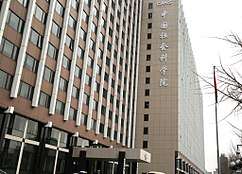Chinese Academy of Social Sciences
The Chinese Academy of Social Sciences (CASS), is a Chinese research institute and think tank with historical origins in the Academia Sinica during the Republic of China era. The institution is the premier, comprehensive national academic research organization in the People's Republic of China for the study in the fields of philosophy and social sciences, with the obligation of advancing and innovating in the scientific research of philosophy, social sciences and policies. It was described by Foreign Policy magazine as the top think tank in Asia.[1] It is affiliated with the PRC's State Council.
中国社会科学院 | |
 | |
| Abbreviation | CASS |
|---|---|
| Formation | 1977 |
| Type | Research Organization; Think Tank |
| Location | |
President | Xie Fuzhan |
| Affiliations | State Council of China |
Staff | 3200 |
| Website | casseng |
| Chinese Academy of Social Sciences | |||||||
|---|---|---|---|---|---|---|---|
| Simplified Chinese | 中国社会科学院 | ||||||
| Traditional Chinese | 中國社會科學院 | ||||||
| |||||||
History
The CASS was established in May 1977, based on the 14 research units of the Department of Philosophy and Social Sciences of the Chinese Academy of Sciences, with the aim of promoting the development of philosophy and social sciences, under the instruction of Deng Xiaoping. The first president was Hu Qiaomu, and the current president is Xie Fuzhan.
The quantity of scholars participating in academic exchanges has gone from dozens of people divided into 10 batches in 1979, to over 4,100 people divided into 1398 batches in 1995. In the meanwhile, CASS has established a constructive relationship with over 200 research organizations, academic communities, institutions of higher learning, foundations and related government departments, covering more than 80 countries and regions.
The Dictionary Editing Office of the Institute of Linguistics edits A Dictionary of Current Chinese.[2]
Structure

The CASS comprises five academic divisions:
- Philosophy, Literature and History
- Economics
- Law, Social studies and Political studies
- International Studies
- Marxist studies
It is made up of 35 research institutes:
- Academy of Marxism
- Institute of Literature
- Institute of Ethnic Literature
- Institute of Foreign Literature
- Institute of Linguistics
- Institute of Philosophy
- Institute of World Religions
- Institute of Archaeology
- Institute of History
- Institute of Modern History
- Institute of World History
- Institute of Political Science
- Institute of Ethnology and Anthropology
- Institute of Sociology
- Institute of Law
- Institute of International Law
- Institute of World Economy & Politics
- Institute of Economics
- Institute of Industrial Economics
- Rural Development Institute
- Institute of Finance and Trade Economics
- Institute of Finance and Banking
- Institute of Quantitative and Technical Economics
- Institute of Population and Labor Economics
- Institute for Urban and Environmental Studies
- Institute of Journalism and Communication Studies
- Research Center for Chinese Borderland History and Geography
- Institute of Taiwan Studies
- Institute of Russian, Eastern European & Central Asian Studies
- Institute of European Studies
- Institute of West-Asian and African Studies
- Institute of Latin American Studies
- Institute of Asia-Pacific Studies
- Institute of American Studies
- Institute of Japanese Studies
CASS has also more than 90 research centers, one graduate school (Graduate School of Chinese Academy of Social Sciences) and one university - the University of the Chinese Academy of Social Sciences (UCASS) was officially established in 2017. It is also in charge of 105 national academic communities throughout China.
CASS currently has over 3,200 resident scholars.[3] CASS membership and honorary membership are both conferred for life and are the highest academic titles of the academy. There are 47 members and 95 honorary members.
Publishing house
The China Social Sciences Press (Chinese: 中国社会科学出版社; pinyin: Zhōngguó Shèhuì Kēxué Chūbǎnshè) was established in June 1978 under the auspices of the Chinese Academy of Social Sciences, and has published over 8,000 books since its inception.[4]
List of presidents
- Hu Qiaomu (胡乔木): 1977–1982
- Ma Hong (马洪): 1982–1985
- Hu Qiaomu: 1985–1988
- Hu Sheng (胡绳): 1988–1998
- Li Tieying (李铁映): 1998–2003
- Chen Kuiyuan (陈奎元): 2003–2013
- Wang Weiguang (王伟光): April 2013 – March 2018
- Xie Fuzhan (谢伏瞻): March 2018 – Incumbent
Source: China Social Science Network[5]
See also
- Academia Sinica
- Chinese Academy of Sciences
- Imperial Hanlin Academy
- Scientific publishing in China
References
- The Think Tank Index, Foreign Policy, archived from the original on 2009-01-19
- 中国社会科学院语言研究所词典编辑室, ed. (1 September 2016). 现代汉语词典(第七版) [A Dictionary of Current Chinese] (Seventh ed.). Beijing: The Commercial Press. ISBN 978-7-100-12450-8.
- 历史沿革 (in Chinese), Chinese Academy of Social Sciences, archived from the original on 2012-07-22, retrieved 2010-07-14
- 潘衍习 [Pan Yanxi] (2008-11-17), 中国社科出版社三十年硕果累累 [China Social Sciences Press' accumulated achievements of thirty years], People's Daily, archived from the original on 2011-07-21, retrieved 2010-07-14
- 院领导 [Leaders of the Academy] (in Chinese). Chinese Academy of Social Sciences. Retrieved 25 August 2013.
External links
- Official website (in Chinese)
- Official website (in English)